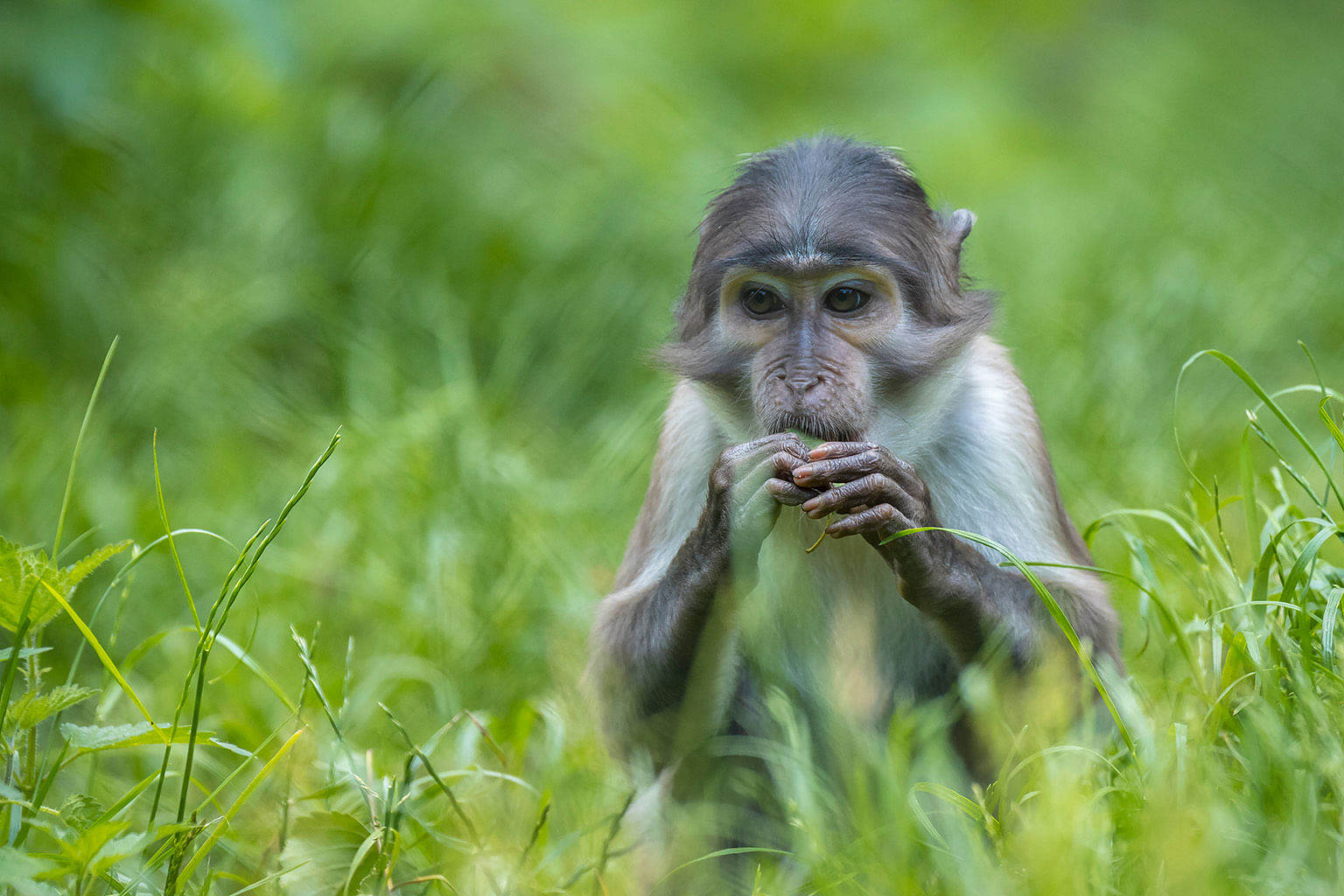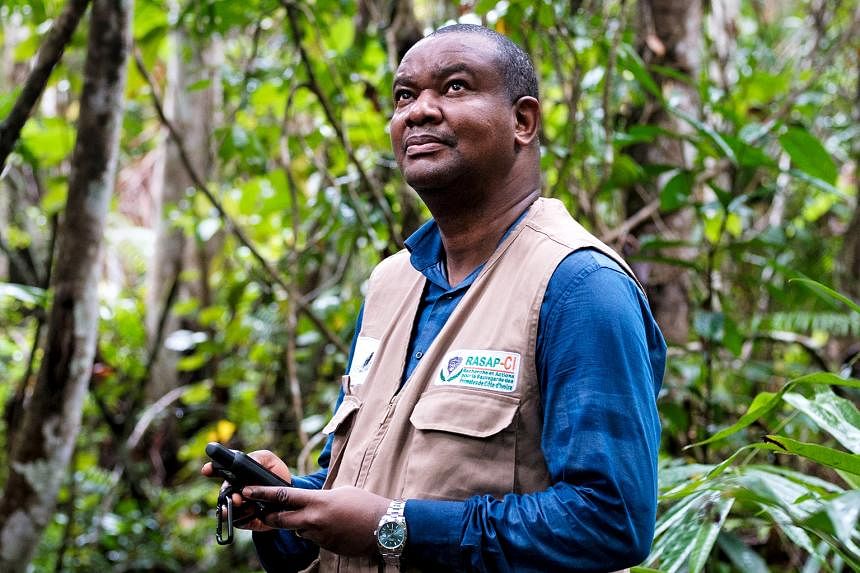Walk around Singapore’s nature reserves and you will probably see a variety of animals, from pangolins and monkeys to squirrels and possibly even the rarer mousedeer. The reserves are not just green lungs for Singapore but also home to thousands of plant and animal species, including critically endangered and newly discovered ones.
Now imagine the reserves cut down to a fraction of their size through deforestation and other threats. Such destruction taking place in West Africa’s Cote d’Ivoire is what spurred its veteran conservationist Inza Kone to step up and do his part to protect the remnants of his nation’s once-extensive primary rainforests and their wildlife.
Over the years, deforestation and other threats have reduced the forests to just two per cent of their former size. In 2006, Mr Kone helped to establish a conservation programme for one of the key remaining ones, the 11,000ha Tanoe-Ehy swampy forest which contains an array of threatened species, including four of the most endangered primates in the region.
The pioneering programme involves 11 communities living in the area, enabling people who once clashed with its wildlife to become its protectors. For example, locals who previously poached the forest’s animals now guide the 54-year-old and his team on monthly expeditions to study the area. “These former hunters have knowledge that the most advanced scientists don’t have,” he notes.
His campaign’s benefits of saving the environment and biodiversity, and involving and uplifting local communities, impressed Swiss watchmaker Rolex, which selected him as one of its 2023 Rolex Awards for Enterprise Laureates. He plans to use the award for capacity building, ecological monitoring, environmental education and other efforts.
Another long-cherished goal is to extend the conservation zone across the border into Ghana, to cover the latter’s forests too. Mr Kone elaborates: “Our project has reached a stage where we need more exposure and recognition, nationally and internationally. The Rolex Awards is one of the best platforms to achieve this.
“Winning the award brings me immense pride because it is an incredibly competitive prize. It has already strengthened our team’s belief in our ability to convince people of what we can do, and our impact on the field. With the award, we can better continue our mission, so that the communities stay motivated and committed to their conservation work too.”
Communities at the heart of conservation
For Mr Kone, the desire to safeguard wildlife began from an early age. When he was eight, his father gave him a young baboon as a pet. Although he loved the monkey dearly, it became too difficult to handle as it got older, and too used to human interaction to be released into the wild, leaving euthanasia as the only option.

“Since then, I’ve thought about wild animals differently, especially primates,” he shares. With the conviction that such creatures are best left in the wild, he devoted his life to studying and protecting them, eventually blazing a trail as Cote d’Ivoire’s first primatologist. He is also currently president of the African Primatological Society.
In 2008, soon after he started partnering with the Tanoe-Ehy communities, he found himself spearheading a campaign against proposals to convert 8,000ha of the forest to a palm oil plantation. Alongside local leaders, the campaign won a landmark victory after a long fight: The Ivorian government declared the forest a community-managed nature reserve in 2021.
“The communities joined forces to protect their common, ancestral heritage and biodiversity for future generations,” Mr Kone says. Today, his team is working with the 11 villages to carry out a four-year plan to plant and monitor trees in three hectares of farmland per village per year. Each village will also have a botanical garden for education and to preserve local flora.
The team also collaborates with the villagers to find sustainable livelihoods for them, such as cassava farming, to replace poaching and other activities harmful to the forest and its species. For instance, providing modern equipment in a small processing plant has increased cassava farmers’ income fivefold. The aim is for the villagers to manage the forest by themselves.
With the forest’s future secured for now, Mr Kone is turning to documenting its varied wildlife, some of which are unique to the region. He is supplying local people with equipment as well as training them in environmental monitoring techniques, such as drone surveys, camera trap monitoring, and sampling DNA traces in the environment left by wildlife.

In particular, he wants to prove the presence of a critically endangered monkey called Miss Waldron’s red colobus. The last confirmed sighting of the species globally was in 1978, but locals have reported seeing it and he has heard its distinctive cries. Since the forest may be the monkeys’ only habitat on Earth, finding them would strengthen the case for its protection.
Helping people and nature live in harmony
As Mr Kone forges ahead, he hopes that the Tanoe-Ehy project will inspire others to develop community-based forest conservation measures throughout West Africa. He is also currently director-general of Cote d’Ivoire’s Swiss Centre for Scientific Research and a senior lecturer of conservation biology at the country’s University of Felix Houphouet-Boigny.
For his achievements, he has been named a Commander in the Order of Merit of National Education in Cote d’Ivoire, and received the United States’ International Primatology Society’s Special Award, United Kingdom’s Whitley Award for conservation, and Netherlands’ Future for Nature Award for innovation and creativity in conservation, among other accolades.
With the 160 Rolex Awards Laureates to date including Chinese-Canadian tech entrepreneur Miranda Wang, who is turning previously unrecyclable plastics into valuable products, and Indian environmentalist Arun Krishnamurthy, who is mobilising the public to rehabilitate his country’s lakes, and other innovators, Mr Kone says that he is honoured to join their ranks.
“I have a deep respect for all those who have won the award before me, and it gives me a sense of responsibility,” he explains.
The Rolex Awards are also part of the wider Rolex Perpetual Planet Initiative launched in 2019. This empowers people and organisations that harness science and technology to understand the world’s environmental challenges, and to develop revolutionary solutions that contribute to addressing the issues and restoring balance to fragile natural ecosystems.
The Initiative has a diverse and expanding portfolio of more than 20 partnerships, with organisations such as Rewilding Argentina and Rewilding Chile, which protect landscapes in South Africa, Coral Gardeners, which transplants resilient corals to reefs, and Great Spine of Africa expeditions that explore the continent’s major river basins.
Rolex also supports organisations and initiatives that foster the next generations of explorers, scientists and conservationists through scholarships and grants, including the Our World-Underwater Scholarship Society and The Rolex Explorers Club Grants, and the Explorers Club’s Global Exploration Summit, which gathers world-leading explorers annually.
Mr Kone highlights: “Becoming part of the Rolex Perpetual Planet Initiative has shown everyone that our conservation programmes have real potential, and will enable us step up our efforts. What keeps us going is above all the value of the forest. In our way, we are helping to reconcile man and nature, so that humans and wildlife can live in perfect harmony.”
We The Earth is a partnership between The Straits Times and Rolex and its Perpetual Planet Initiative. Mr Inza Kone, a 2023 Rolex Awards for Enterprise Laureate, is a stellar example of the many individuals who are doing their part to solve the issues Earth faces.

